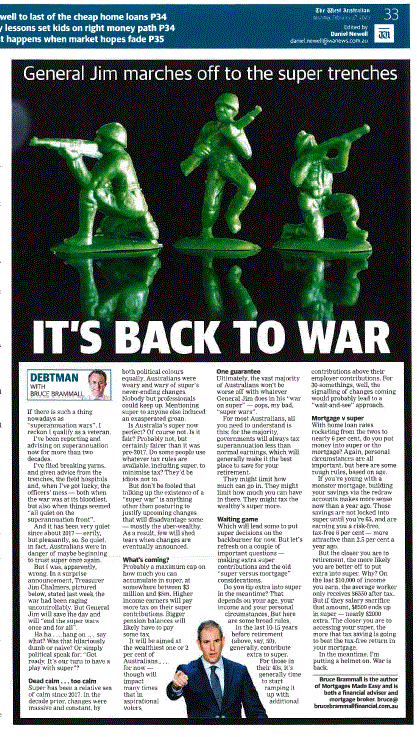
Bruce Brammall, The West Australian, 27 February, 2023
If there is such as thing nowadays as “superannuation wars”, I reckon I qualify as a war veteran.
I’ve been reporting, and advising, on superannuation now for more than two decades. I’ve filed breaking yarns, and given advice from, the trenches, the field hospitals and, when I got lucky, the officers’ mess, both when the war was at its bloodiest, but also when things seemed “All Quiet on the Superannuation Front”.
And it has been “very quiet” since about 2017. Eerily, but pleasantly, so.
So quiet, in fact, Australians were in danger of maybe beginning to trust super once again.
But I was, apparently, wrong.
In a surprise announcement, Treasurer Jim Chalmers stated last week that war has been raging uncontrollably. But General Jim will save the day and will “end the super wars once and for all”.
HAHAHAAA … hang on … say, what? Was that hilariously dumb/naïve? Or simply political speak for: “Get ready. It’s our turn to have a play with super”?
Dead calm
Super has been a relative sea of calm since 2017. In the decade prior, changes were massive and constant, by both political colours equally. Australians were weary and wary of super’s neverending changes. Nobody but professionals could keep up. Mentioning super to anyone else induced an exasperated groan.
Is Australia’s super now perfect? Of course not. Is it fair? Probably not, but certainly fairer than it was pre-2017.
Do some people use whatever tax rules are available, including super, to minimise tax? They’d be idiots not to.
But don’t be fooled that talking up the existence of a “super war” is anything other than posturing to justify upcoming changes that will disadvantage some.
Mostly the uber wealthy. As a result, few will shed tears when changes are eventually announced.
What’s coming?
Probably a maximum cap on how much you can accumulate in super, at somewhere between $3m and $5m. Higher income earners will pay more tax on their super contributions. Bigger pension balances will likely have to pay some tax.
It will be aimed at the wealthiest 1 or 2 per cent of Australians (though will impact many times that in aspirational voters). For now.
One guarantee
Ultimately, the vast majority of Australians won’t be worse off by whatever General Jim does in his “war on super”. Oops, my bad, the “super wars”.
For most Australians, all you need to understand is this.
For the majority, governments will always tax superannuation less than normal earnings, which will generally make it the best place to save for your retirement.
They might limit how much can go in. They might limit how much you can have in there. They might tax the wealthy’s super more.
Waiting game
Which will lead some to put super decisions on the backburner for now.
But let’s refresh on a couple of important questions – making extra super contributions and the old “super versus mortgage” considerations.
Do you tip extra into super in the meantime?
That depends on your age, your income and your personal circumstances. But here are some broad rules.
In the last 10-15 years before retirement (above, say, 50), generally, contribute extra to super.
For those in their 40s, it’s generally time to start ramping it up, with additional contributions above their employer contributions. For 30-somethings, well, the signalling of changes coming would probably lead to a “wait and see” approach.
Mortgage v super
And, with home loan rates rocketing from the 2s to nearly 6 per cent, do you put money into super or the mortgage?
Again, personal circumstances are all important, but here are some rough rules, based on age.
If you’re young with a monster mortgage, building your savings via the redraw accounts makes more sense now than a year ago.
Those savings are not locked into super until you’re 65, and are earning you a risk-free, tax-free, 6 per cent – more attractive than 2.5 per cent a year ago.
But the closer you are to retirement, the more likely you are better off to put extra into super.
Why? On the last $10,000 of income you earn, the average worker only receives $6550 after tax. But if they salary sacrifice that amount, $8500 ends up in super. Nearly $2000 extra.
The closer you are to accessing your super, the more that tax saving is going to beat the tax-free return in your mortgage.
In the meantime, I’m putting a helmet on. War is back.
Bruce Brammall is the author of Mortgages Made Easy and is both a financial adviser and mortgage broker. E: bruce@brucebrammallfinancial.com.au.